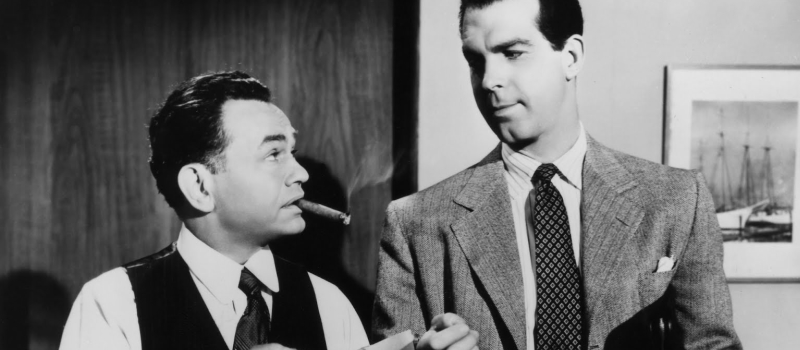I’ve found as I get older that my relationship to film changes – or at least my circumstance and ability to relate to it.
While they may be fixed indelibly onto celluloid or locked in digital, the person behind the eyes we see them through isn’t the same from one viewing to the next. Some films once adored I’ve fallen out of love with, but, mostly, luckily, I’ve founded my appreciation has deepened.
When I first watched Double Indemnity, Billy Wilder’s film noir par excellence and his first outright classic, I saw it only as a work of genre. There’s the cool, cynical anti-hero, insurance agent Walter Neff (Fred McMurray). There’s the femme fatale, blonde-locked housewife Phyllis Dietrichson (Barbara Stanwyck). Then there’s the murder: that of her stick-in-the-mud husband (Tom Powers), made to seem like a train accident so that the pair can claim twice the value of his life insurance policy – the double indemnity of the film’s title.
I admired the wit – Raymond Chandler’s dialogue is at its hard-boiled best, especially the early banter between Walter and Phyllis (“I’m a native Californian. Born right here in Los Angeles.” “They say all native Californians come from Iowa.”) – and the style – as in that memorable shot over the opening credits of a silhouetted figure hobbling towards camera on crutches. Sunlight filters through slats in Venetian blinds and self-professedly rotten people do rotten things.
Even so, as a work of cinema it seemed utterly detached from my life – then, that of a self-serious, introspective teenager – and the things I care about – then, anything that made me feel like I was intellectually a step ahead of my peers. Now, in a different time and place, something sticks out to me, perhaps appropriately in a genre so often associated with detective fiction; a detail I previously missed or disregarded.
That detail, which now seems to me the most striking element of the whole film, is no less than a whole character: that of Barton Keyes (Edward G. Robinson), the claims adjuster who investigates the murder; and arguably the true protagonist. It’s to him that the doomed Neff dictates the voice-over that guides us through the film – a more grounded version of the trope that Wilder would more famously reuse in Sunset Boulevard.
Pugnacious and magnetic, scrupulously fair and with a love of cheap cigars, Keyes is the film’s one truly ethical character: a hardworking eccentric whose integrity is beyond question. He even gives a would-be fraudster, the uncomprehending Mr. Gorlopis (Fortunio Bonanova), a way out by getting him to sign the insurance waver: “Now you’re an honest man again”.
Keyes’ unimpeachable instincts – the “little man” in his cut” – combined with his knowledge of the actuarial tables (“You know, you, uh, oughta take a look at the statistics on suicide some time…”) make him a highly effective, if deeply stressed, force for decency. His one fault is that he sees the best in Neff: he knows that one of Neff’s clients has committed a murder and yet can’t see his way to suspecting him.
The film’s final exchange, as Neff lies bleeding out in a doorway, Keyes kneeling over him, says it all. “Know why you couldn’t figure this one, Keyes? I’ll tell ya. ‘Cause the guy you were looking for was too close. Right across the desk from ya.” “Closer than that, Walter.” “I love you, too.”
Steeped in irony though it may be, this exchange now resonates with me more than almost anything else in the genre: more than Welles’ cuckoo clock speech or Bogie drawling pithy rejoinders through a cigarette. In a time when it can be hard not to identify more immediately with Neff, the self-interested party, Keyes give us someone to aspire to. A gesture of kindness, like Keyes lighting Neff one last cigarette – in reciprocation, perhaps, for all the time Neff has lit his cigarette over the course of the film – takes on a remarkable resonance.
The world might be a seamy, shadowy one, but as long as there are men like Keyes in it, or at least the prospect of them, there is hope.
A film from BFI Southbank’s Big Screen Classics series screens daily for the special price of £8.
